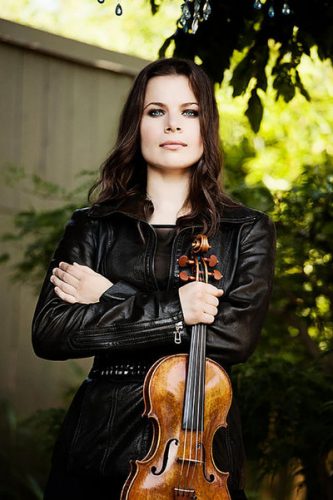
The Eugene Symphony kicks off its 50th season 8 pm Thursday, Sept. 24, in style with a 20th-century American classic and a brand-new 21st-century composition by the West Coast composer who many hope represents part of the future of American music.
In 2003, Mason Bates (still in graduate school) received a commission from the Los Angeles Philharmonic and decided to include beats and other electronica elements.
“Ever since, I’ve been passionate about bringing these two worlds together,” Bates told me in 2008, when I covered his innovative San Francisco Mercury Soul productions that involved him as DJ, composer and presenter, bridging contemporary classical music and electronica.
Still under 40, the Grammy nominee has already racked up a Juilliard pedigree, prestigious Rome and Berlin prizes as well as composer-in-residence posts for the California, Chicago and Pittsburgh symphony orchestras. His hometown San Francisco Symphony just issued an all-Bates album, and more than a dozen orchestras the world over, including the YouTube Symphony Orchestra, have played his music.
The Seattle Symphony’s recent premiere of his Cello Concerto was a major classical music event, and now the Eugene Symphony joins the party with its commission of Bates’ Gramophone Depot, which he describes as “something like a jolting train ride with a blues band chasing behind it.”
For a composer so associated with the future, it’s a bit surprising that this new piece gazes toward the past — his memories of his dad’s swing and jazz records, which Bates marries to electronica rhythms, though not electronic sounds. Bates calls the orchestra “a limitless medium. It’s like the world’s greatest synthesizer.”
The Hult Center concert also includes another piece that joined contemporary American pop rhythms with classical music, George Gershwin’s jazzy 1928 An American in Paris, which used then-outlandish elements like saxophones and a car horn.
Then as now, conservatives carped that such trifles didn’t belong on the same stage as the august classical elders like Beethoven. And of course they were quickly proven wrong, as Gershwin became a staple of classical repertoire. Maybe Bates will too. The concert also features another young rising star, violinist Benjamin Beilman in Saint-Saëns’ Violin Concerto, and the concert concludes with Gershwin’s friend Maurice Ravel’s ravishing Spanish Rhapsody.
The Oregon Mozart Players’ Oct. 3 season-opening concert at the University of Oregon’s Beall Concert Hall features another rising-star fiddler, Bulgarian-born Bella Hristova, who solos in Mozart’s elegant fourth violin concerto, and another pair of musical buddies, Mozart and Haydn, represented by two of their finest symphonies: the former’s darkly dramatic penultimate No. 40, and the latter’s exuberant No. 59.
On Oct. 4, a new trio featuring some old faves (the great pianist and Northwest native Jon Kimura Parker and former Tokyo Quartet cellist and violinist Clive Greensmith and Martin Beaver) opens the UO’s ChamberMusic@Beall season with another Haydn masterpiece — his sparkling trio No. 28 in E major, a Mendelssohn trio, and Shostakovich’s searing 1944 second trio, which captures the great 20th-century Russian horror at the recent revelation of the Holocaust.
On Oct. 5, the UO’s Oregon Brass Quintet plays another inflammatory composition, this one from the 21st century — Anthony DiLorenzo’s brief Fire Dance. The quintet will also perform 20th-century music by longtime L.A. resident Ingolf Dahl and the great Argentine nuevo tango composer Astor Piazzolla.
On the jazz side, Eugene’s super saxman Joe Manis unveils his new trio CD, The Golden Mean, with the terrific Portland keyboard master George Colligan and drummer Todd Strait Oct. 1 at Christo’s in Salem.
And the smokin’ British funk foursome The New Mastersounds hits Hi-Fi Music Hall Oct. 7, bringing their timeless brew of organ and guitar-led instrumental funk. If you fancy the funky jazz-soul of old school groups like the M.G.s and The Meters, or newer bands like Medeski Martin & Wood, you’ll groove to these guys too.